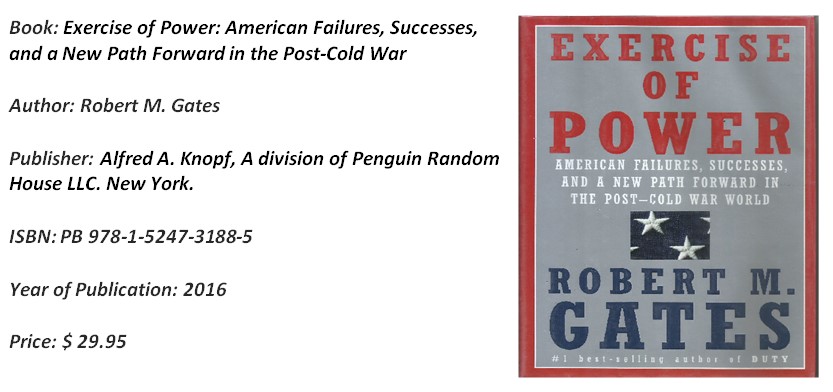Book Review

The book Exercise of Power: American Failures, Successes, and a New Path Forward in The Post-Cold War published by Alfred A. Knopf, A division of Penguin Random House LLC, New York, written by a distinguished public servant Former Secretary of Defense of United States and author of acclaimed # 1 Bestseller memoir Duty. His appointment as Secretary of Defense of United States was culmination of a career in National Security that spanned over four decades ad included appointments as Deputy Director of Central Intelligence, Deputy National Security Advisor and Director of Central Intelligence Agency.
The book Exercise of Power is an unsparing, sweeping examination of power in all its manifestations, for good or bad by American Presidents in post-Cold War era. Since end of Cold War, global perception of United States has morphed from dominant international leader to disorganised entity unwilling to continue to accept the mantle of global leadership and unable to govern itself effectively. Gates argues that this transformation is result of failure of political leaders to understand the complexity of American power, its many instruments and its limitations. The author is very frank, forthright and objective in thought-provoking, compelling assessment of what have been the successes, failures - of what has been achieved or not achieved by United States and what can be done in future to restore and extend the American power. In his first chapter, “A Symphony of Power’, Gates discusses 15 different instruments of national power. The majority of the book is a series of case studies, where Gates recounts, how America applied its power in various conflicts. The book is a great review of how diplomacy, intelligence, economic levers and strategic communication could be used to achieve National Security goals.
The author discusses that United States while still the planet’s most powerful country militarily and economically, is challenged on every front. China is ascending and likely at some point to surpass United States economically in terms of gross domestic product; Russia is modernising its military and is aggressively attempting to destabilise western democracies and dominate its neighbours; North Korea has become a wild-card nuclear power; Middle East remains a sinkhole of conflict – Civil war in Syria, War against Islamic State of Iraq and Levant brought troops from Russia, Iran, Turkey and United States to the battlefield; Afghanistan is in turmoil; Iran continues to strengthen its military capabilities and intensifies its meddling from Lebanon to Syria to Yemen and even tries to contest for religious and regional supremacy with Saudi Arabia. Multilateral institutions have been weakened as are even alliances.
Gates has clear views on the need for American power beyond military. The author makes clear that the successful exercise of power is far from limited to the use of military might or the ability to coerce or demand submission, but must encompass diplomacy, economics, strategic communications, technology, intelligence, developmental assistance, ideology and cybernetics as well. An eclectic and multipronged approach is needed for successful exercise of power.
Answering where America is widely perceived internationally today, Gates argues that understanding multiple forms of power that contributed to America’s achievement of historical singularity and earlier leaders’ skill in using many and diverse forms of power to the road to that high point. He also emphasises failure to recognise, resource and use arsenal of non-military assets that proved of critical importance in long contest with Soviet Union and also need to reimagine and rebuilding those non-military tools. He discusses how non-coercive tools have been allowed to atrophy in recent years due to lack of appreciation, lack of funding and lack of strategy. The need of leaders to understand the expansiveness and limitations of complexity of the power will go a long way for enhancing success.
Gates analyses the specific challenges faced in the post – Cold War period in Iran, Iraq, Syria, Libya, Russia, China, Colombia, Haiti, Somaia, Yugoslavia, Georgia, Africa, Ukraine. He deconstructs the ways in which leaders have used the instruments of power available to them in a candid manner and argues that National Security will require learning and abiding by the lessons of the past, restructuring and reimagining the approach and revitalising the nonmilitary instruments of power essential to success and security.
The book brings profound knowledge, insight and wisdom of the author and his first hand experience as well as wide ranging historical knowledge which will be immensely useful for the reader. The author discusses fifteen significant post-Cold War challenges which will provide continuity and how America can apply its power around the world. The author then gives ten case studies in post cold war. The author finishes with the chapter “Lessons Learned”, which is a very strong and pragmatic section, with concrete suggestions, highlighting the new times, new challenges and some practical changes that need to be made, in particular to using all non-military levers of power in an integrated way.
The book Exercise of Power is not a memoir nor is it a foreign policy textbook. It is more of book of implementation of foreign policy. National Security professionals should study it for its analysis of when to use the military and when to use non-military power effectively.
Exercise of Power is a must read for any person engaged in crafting, influencing, and executing foreign policy, as also serious students of international relations and geo-politics and those associated with national security apparatus in any country.

